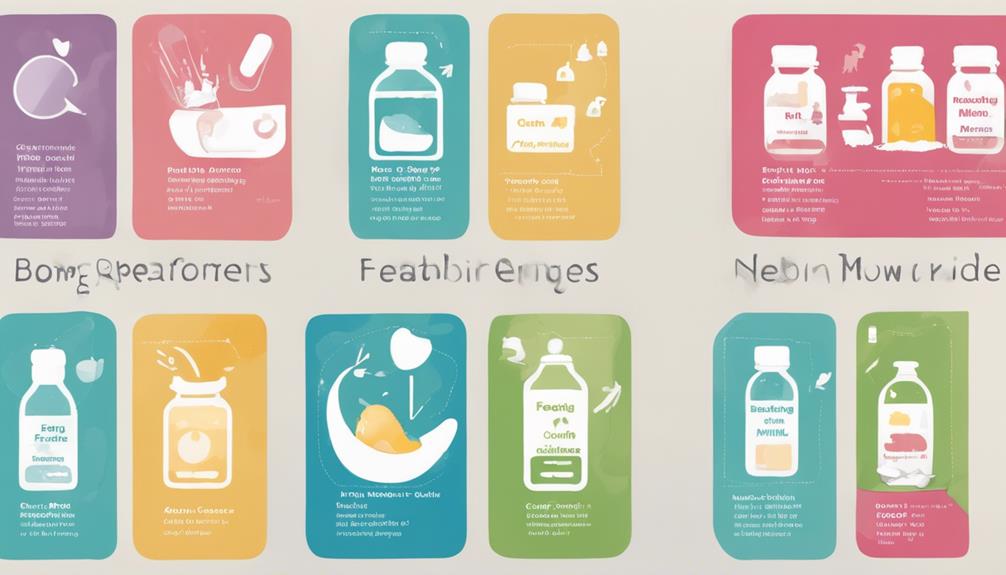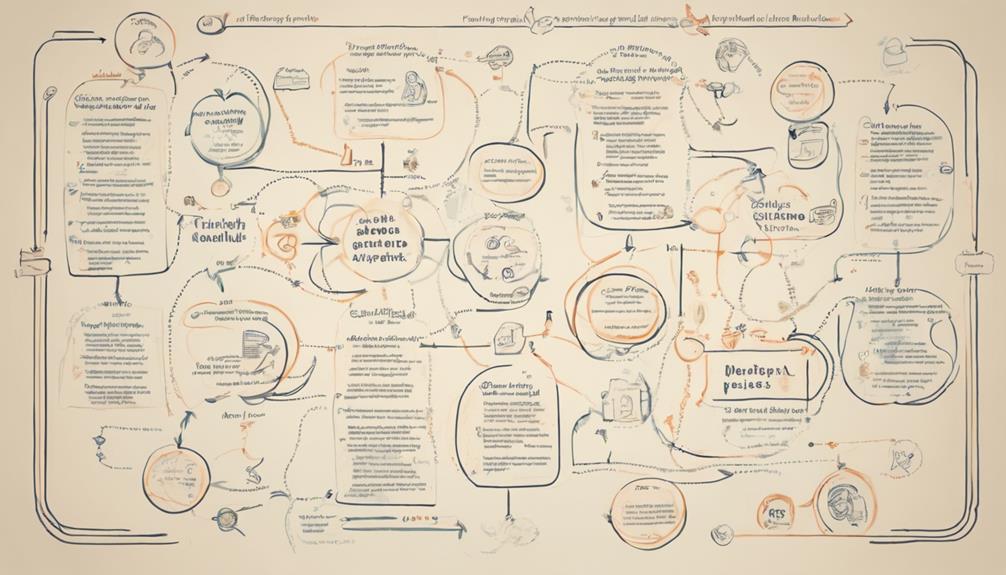Efficient plans for newborn care are outlined in Creating Efficient Plans for Newborn Care: A Detailed Guide, offering a comprehensive roadmap for successfully navigating the intricate world of newborn care.
From establishing personalized feeding schedules to monitoring essential developmental milestones, this guide equips caregivers with the tools needed to guarantee ideal care for newborns.
But what sets this guide apart is its focus on not just providing information but empowering caregivers to take charge of their newborn's well-being.
Join us as we explore the key strategies and vital components that pave the way for crafting effective newborn care plans that prioritize individualized care and foster a nurturing environment right from the start.
Key Takeaways
- Establish personalized feeding schedules for newborns based on monitoring and guidance.
- Implement consistent sleep routines to support optimal sleep-wake cycles and self-soothing skills.
- Practice gentle hygiene habits to promote skin health, prevent infections, and aid in healing.
- Monitor and support developmental milestones to detect delays early and provide tailored interventions.
Essential Components of Care Plans
In crafting effective care plans for newborns, we prioritize essential components such as feeding schedules, sleep patterns, hygiene practices, and developmental milestones. These elements form the foundation of newborn care plans, ensuring that each infant receives the necessary attention and support for their growth and development. By tailoring care plans to individualized approaches, we can address specific needs and challenges that newborns may encounter.
Monitoring newborn growth is a critical aspect of these care plans, allowing us to track progress, identify any concerns early on, and make necessary adjustments. Additionally, promoting the overall well-being of newborns involves not only physical health but also emotional and cognitive development. Care plans aim to empower caregivers by providing them with the knowledge and tools needed to offer the best possible care to their little ones.
Feeding Schedule Considerations

Establishing a consistent feeding schedule is crucial for promoting the healthy growth and development of newborns. Newborns typically feed every 2-3 hours, amounting to about 8-12 feedings per day.
Breastfeeding on demand is beneficial as it helps fulfill the baby's nutritional requirements and fosters a strong bond between the caregiver and infant. It's essential to monitor feeding patterns and output to gauge adequate intake and hydration levels for the newborn.
Seeking guidance from a healthcare provider or lactation consultant can offer valuable insights into crafting an effective feeding schedule and mastering feeding techniques. This collaboration guarantees that the newborn receives proper nourishment while enhancing the bonding experience between the caregiver and infant.
Prioritizing a well-thought-out feeding schedule not only supports the infant's health but also strengthens the emotional connection between the caregiver and newborn, laying a solid foundation for their future well-being.
Sleep Routine Establishment
Managing the care of newborns involves not only ensuring a consistent feeding schedule but also establishing a soothing sleep routine that supports their overall health and development. Newborns thrive on routine, so creating a calming bedtime routine can help regulate their sleep-wake cycle. By providing a predictable sequence of events before bedtime, such as a warm bath, gentle rocking, or soft lullabies, you can signal to the newborn that it's time to wind down and prepare for sleep. This aids in self-soothing and helps them form positive sleep associations.
Consistency in sleep routines is key to reducing sleep disruptions, improving sleep quality, and fostering healthy development. Newborns typically need 14-17 hours of sleep per day, interspersed with short periods of wakefulness for feeding and bonding. Monitoring and adjusting the sleep routine based on your newborn's cues and needs can optimize their sleep patterns, contributing to their overall growth and well-being.
Hygiene Practices and Tips

Maintaining proper hygiene practices is essential in safeguarding newborns from infections and promoting their overall health and well-being. When caring for a newborn, it's important to pay attention to their skin care, body temperature, and signs of infection.
Here are some key tips to guarantee proper hygiene practices:
- Bathing newborns 2-3 times a week is sufficient to keep them clean without drying out their delicate skin.
- Use mild, fragrance-free baby products to avoid skin irritation and maintain skin integrity.
- Clean the umbilical stump with alcohol wipes until it falls off naturally to prevent infections and promote healing.
Monitoring Developmental Milestones
Monitoring a newborn's developmental milestones is essential for identifying early signs of potential delays and ensuring timely support and interventions. Developmental milestones encompass a range of skills newborns should acquire at specific stages, including physical, cognitive, social, and emotional abilities.
By diligently tracking these milestones, parents and healthcare providers can observe a newborn's progress and confirm they're meeting typical developmental expectations. Examples of such milestones include the ability to hold up the head, track objects with their eyes, and respond to sounds.
Early detection of developmental delays through milestone monitoring is critical as it allows for prompt interventions and therapies to support optimum growth and development. Detecting delays early on paves the way for tailored interventions that can address specific areas of concern, ensuring that newborns receive the necessary support for reaching their developmental potential.
Regular monitoring and prompt action play a fundamental role in promoting a newborn's overall well-being and successful developmental journey.
Frequently Asked Questions
How to Do a Care Plan Step by Step?
We start by identifying specific healthcare needs and setting measurable goals. Then, we develop tailored interventions based on assessments and collaborate with the team and parents for input. Regular evaluations guarantee the care plan evolves for best newborn care.
How Do You Write an Effective Care Plan?
We write effective care plans by identifying needs, setting goals, collaborating with the team, implementing tailored interventions, and evaluating regularly. Documentation and communication are key for seamless care. We guarantee the plan evolves as needed for best outcomes.
What Are the 5 Main Components of a Care Plan?
In our experience, the 5 main components of a newborn care plan include feeding schedules, sleep patterns, hygiene practices, developmental milestones, and individualized approaches. These elements are crucial for nurturing and promoting the well-being of newborns.
How Can I Draw a Nursing Care Plan?
We draw nursing care plans by evaluating needs, setting tailored goals, involving caregivers, prioritizing tasks, and reviewing the plan regularly. It's essential to adapt the plan as the patient's needs evolve, ensuring thorough and effective care.
Conclusion
In summary, developing personalized care plans for newborns is essential for their overall well-being and development.
Did you know that babies typically double their birth weight by age 5 months?
By following the step-by-step guide outlined in this article, caregivers and healthcare professionals can guarantee that newborns receive the necessary support and care to thrive.
Let's continue to prioritize individualized care plans to nurture and support our little ones.









